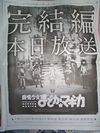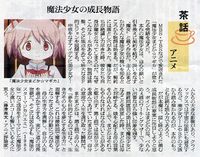Newspapers: Difference between revisions
Randomanon (talk | contribs) (Created page with "== March 2, 2011 Yomiuri Shimbun Article == thumb|80px Evening edition. Translation source: [http://animapple.blogspot.com/2011/03/madoka-yumiuri-newspaper-ur...") |
Randomanon (talk | contribs) No edit summary |
||
| Line 49: | Line 49: | ||
File:June 2011.jpg|June 2011. | File:June 2011.jpg|June 2011. | ||
</gallery> | </gallery> | ||
[[Category:Translation request]] | |||
Revision as of 03:43, 7 July 2011
March 2, 2011 Yomiuri Shimbun Article
Evening edition. Translation source: [1]
Urobuchi, "At first, I was aware of the intention of off-guarded surprise."
"I was asked for the unforeseeable cruel tone, thus even if the cover is 'mahou shoujo', inside is 'operation-as-usual' of myself."
About QB: "There is no malicious intent, but his moral value is fundamentally different from human. Way of confronting something different in kind is one of focus of the story that I'm thinking of."
"I want to end this series with the story of DREAMS AND HOPE, but I don't know if watchers will accept it that way."
April 20, 2011 Yomiuri Shimbun Ad
Ad placed shortly before episode 11 and 12 aired.
Aniplex placed a full page ad in Yomiuri Shimbun (largest newspaper circulation in the world) which 2ch sources estimated an expenditure of 49,455,000 yen (approximately 600K USD).
There were reports that Yomiuri Shimbun sold out in many places because of this ad.
May 2011 Asashi Evening Newspaper
From Asahi Evening (朝日夕刊) newspaper, early May 2011.
Summary from symbv from evageeks.forum:
Besides the introduction of what PMMM is about, the author (who was billed as an anime critic) presented the following insights:
- PMMM saw quite a lot of influence from gal game and he believes an "orthodox" interpretation of the anime should be taken from the perspectives of gal game and sci-fi.
- One important ingredient of enjoying the anime, in his view, is the undercurrent of the character development of the protagonist Madoka. And he believes the key to it is Madoka's mother who left a strong impression even though she made only infrequent appearances.
- He compared the Madoka in Ep.11 when she would reply to a worrying mother's words with a determination about thing that she had to do and wanted to do, and the Madoka in Ep.1 when she would meekly (but happily) accepted her mother's advice of wearing a ribbon to school.
- He then picked up Madoka's mother words in Ep.3 "living life not to make your dream the goal but to turn this way of living life into your dream", and commented that this was clearly understood by Madoka then. This led to the actions she managed to do in Ep.12.
- He believes PMMM could be viewed as an orthodox coming-of-age story. Here Madoka got to understand how her beloved mother lived her life and at the end through this Madoka made the decision of how she wanted to live her life.
- He also saw similarity of PMMM to the 1985 mahou shoujo anime "Magical Emi, the Magic Star" in its theme of dealing with growing up.
Another translation summary: Seems to be a column deciphering some story-points. It talks about the girls contracting and then being forced to fight witches and the hidden magical girls equals witches rule. With this as the focal point in the last part of the story it gets its sci-fi twist. There is also something about galges being an influence. It also talks about the character growth. Madoka's mum leaving a strong impression as a working mother and with her rough speech, coming into confrontation with Madoka in ep 11. It relates to episode 1 where her mom choose the ribbons for her, but now she chooses her path for herself. That's also in relation to the episode 3 talk about her mom's lifestyle choice/dream and how she gets satisfaction out of that. There is also a mention of magic star magical emi having a similar theme.








